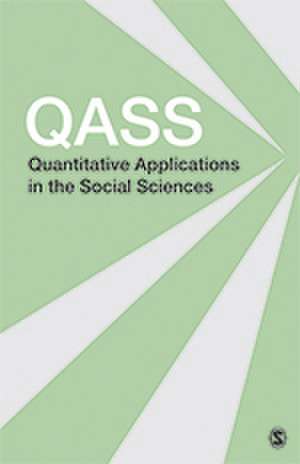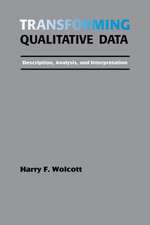Time Series Analysis: Regression Techniques: Quantitative Applications in the Social Sciences, cartea 9
Autor Charles W. Ostromen Limba Engleză Paperback – 12 mar 1990
Din seria Quantitative Applications in the Social Sciences
-
 Preț: 323.09 lei
Preț: 323.09 lei -
 Preț: 285.10 lei
Preț: 285.10 lei -
 Preț: 285.33 lei
Preț: 285.33 lei -
 Preț: 274.06 lei
Preț: 274.06 lei -
 Preț: 285.37 lei
Preț: 285.37 lei -
 Preț: 321.52 lei
Preț: 321.52 lei -
 Preț: 330.81 lei
Preț: 330.81 lei -
 Preț: 322.61 lei
Preț: 322.61 lei -
 Preț: 321.79 lei
Preț: 321.79 lei -
 Preț: 323.15 lei
Preț: 323.15 lei -
 Preț: 273.46 lei
Preț: 273.46 lei -
 Preț: 275.42 lei
Preț: 275.42 lei -
 Preț: 277.33 lei
Preț: 277.33 lei -
 Preț: 322.06 lei
Preț: 322.06 lei -
 Preț: 286.18 lei
Preț: 286.18 lei -
 Preț: 285.71 lei
Preț: 285.71 lei -
 Preț: 322.06 lei
Preț: 322.06 lei -
 Preț: 321.52 lei
Preț: 321.52 lei -
 Preț: 322.30 lei
Preț: 322.30 lei -
 Preț: 285.47 lei
Preț: 285.47 lei -
 Preț: 322.61 lei
Preț: 322.61 lei -
 Preț: 321.79 lei
Preț: 321.79 lei -
 Preț: 323.15 lei
Preț: 323.15 lei -
 Preț: 323.36 lei
Preț: 323.36 lei -
 Preț: 322.41 lei
Preț: 322.41 lei -
 Preț: 323.42 lei
Preț: 323.42 lei -
 Preț: 322.61 lei
Preț: 322.61 lei -
 Preț: 284.99 lei
Preț: 284.99 lei -
 Preț: 285.47 lei
Preț: 285.47 lei -
 Preț: 284.99 lei
Preț: 284.99 lei -
 Preț: 289.18 lei
Preț: 289.18 lei -
 Preț: 287.82 lei
Preț: 287.82 lei -
 Preț: 316.12 lei
Preț: 316.12 lei -
 Preț: 288.96 lei
Preț: 288.96 lei -
 Preț: 316.71 lei
Preț: 316.71 lei -
 Preț: 314.98 lei
Preț: 314.98 lei -
 Preț: 317.26 lei
Preț: 317.26 lei -
 Preț: 314.60 lei
Preț: 314.60 lei -
 Preț: 289.95 lei
Preț: 289.95 lei -
 Preț: 289.18 lei
Preț: 289.18 lei -
 Preț: 315.36 lei
Preț: 315.36 lei -
 Preț: 314.98 lei
Preț: 314.98 lei -
 Preț: 314.38 lei
Preț: 314.38 lei -
 Preț: 316.33 lei
Preț: 316.33 lei -
 Preț: 316.51 lei
Preț: 316.51 lei -
 Preț: 314.76 lei
Preț: 314.76 lei -
 Preț: 288.41 lei
Preț: 288.41 lei -
 Preț: 316.51 lei
Preț: 316.51 lei
Preț: 285.29 lei
Nou
Puncte Express: 428
Preț estimativ în valută:
54.59€ • 57.41$ • 45.11£
54.59€ • 57.41$ • 45.11£
Carte tipărită la comandă
Livrare economică 17 aprilie-01 mai
Preluare comenzi: 021 569.72.76
Specificații
ISBN-13: 9780803931350
ISBN-10: 0803931352
Pagini: 96
Dimensiuni: 140 x 216 x 6 mm
Greutate: 0.12 kg
Ediția:Will Be Reissue.
Editura: SAGE Publications
Colecția Sage Publications, Inc
Seria Quantitative Applications in the Social Sciences
Locul publicării:Thousand Oaks, United States
ISBN-10: 0803931352
Pagini: 96
Dimensiuni: 140 x 216 x 6 mm
Greutate: 0.12 kg
Ediția:Will Be Reissue.
Editura: SAGE Publications
Colecția Sage Publications, Inc
Seria Quantitative Applications in the Social Sciences
Locul publicării:Thousand Oaks, United States
Cuprins
Introduction
Time Series Regression Analysis
Nonlagged Case
A Ratio Goal Hypothesis
The Error Term
Time Series Regression Model
Nonautoregression Assumption
Consequences of Violating the Nonautoregression Assumption
Conventional Tests for Autocorrelation
An Alternative Method of Estimation
EGLS Estimation (First-Order Autocorrelation)
Small Sample Properties
The Ratio Goal Hypothesis Reconsidered
Extension to Multiple Regression
Conclusion
Alternative Time-Dependent Processes
Alternative Processes
Testing for Higher Order Processes
Process Identification
Estimation
Example
Estimation of Models with Errors Generated by Alternative Time Dependent Processes
Example
Ratio Goal Model Reconsidered
Conclusion
Time Series Regression Analysis
Lagged Case
Distributed Lag Models
Lagged Endogenous Variables
Testing for Autocorrelation in Models with Lagged Endogenous Variables
Estimation
EGLA Estimation
Example
A Revised Ratio Goal Model
Interpreting Distributed Lag Models
Conclusion
Forecasting
Forecast Error
Forecast Generation
Modifying the Forecast Equation
Forecast Evaluation
Example
Conclusion
Summary
Time Series Regression Analysis
Nonlagged Case
A Ratio Goal Hypothesis
The Error Term
Time Series Regression Model
Nonautoregression Assumption
Consequences of Violating the Nonautoregression Assumption
Conventional Tests for Autocorrelation
An Alternative Method of Estimation
EGLS Estimation (First-Order Autocorrelation)
Small Sample Properties
The Ratio Goal Hypothesis Reconsidered
Extension to Multiple Regression
Conclusion
Alternative Time-Dependent Processes
Alternative Processes
Testing for Higher Order Processes
Process Identification
Estimation
Example
Estimation of Models with Errors Generated by Alternative Time Dependent Processes
Example
Ratio Goal Model Reconsidered
Conclusion
Time Series Regression Analysis
Lagged Case
Distributed Lag Models
Lagged Endogenous Variables
Testing for Autocorrelation in Models with Lagged Endogenous Variables
Estimation
EGLA Estimation
Example
A Revised Ratio Goal Model
Interpreting Distributed Lag Models
Conclusion
Forecasting
Forecast Error
Forecast Generation
Modifying the Forecast Equation
Forecast Evaluation
Example
Conclusion
Summary
Notă biografică
Descriere
The great advantage of time series regression analysis is that it can both explain the past and predict the future behavior of variables. This volume explores the regression (or structural equation) approach to the analysis of time series data. It also introduces the Box-Jenkins time series method in an attempt to bridge partially the gap between the two approaches.










